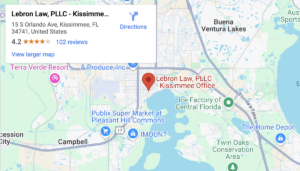Michele A. Lebron | March 17, 2025 | Family Law Blog

When it comes to family law, many people wonder whether they are legally married if they’ve been living together for a long period of time, even without a formal ceremony or marriage license. Common law marriage has long been a topic of confusion, particularly in states like Florida, where the laws surrounding it can be complex.
What is Common Law Marriage?
Common law marriage refers to a situation where a couple lives together and presents themselves as married without a formal marriage ceremony or a marriage license. In states that recognize common law marriage, a couple may be considered legally married if they meet certain criteria. This includes living together for a significant period of time, presenting themselves as a married couple to the public, and having the intention to be married.
However, common-law marriage is not recognized in every state. Florida is one of the states where common-law marriage is not recognized for new relationships, although there are exceptions for those who were already in a common-law marriage in a state where such unions are legally binding.
Common Law Marriage and Florida Law
Under Florida law, common law marriage is not recognized as a valid form of marriage. This means that if you and your partner have been living together for years and have not gone through a formal marriage process, Florida does not consider you legally married. However, the situation is different if you were already in a common law marriage in another state that recognizes such unions.
If you moved to Florida after being in a legally recognized common-law marriage in another state, Florida will honor that marriage. Florida law respects marriages that were legally contracted in other states as long as the marriage was valid under the laws of that state at the time. Therefore, if you and your partner were in a common law marriage in a state like Texas, Colorado, or Iowa—where such marriages are recognized—your marriage will be legally valid in Florida.
In summary, while Florida does not recognize new common-law marriages, it will honor those established in other states, granting the same legal rights and protections as formal marriages.
Divorce and Common Law Marriage in Florida
If you were in a common law marriage in another state and are now residing in Florida, and you decide to end the relationship, you may need to go through the Florida divorce process, as you would if you were formally married. This includes dividing marital assets and liabilities, determining child custody and child support, and addressing spousal support (alimony) if applicable.
It is important to note that common-law marriages can be just as complicated as traditional marriages when it comes to divorce. Florida courts will divide marital property equitably, considering factors such as the length of the relationship, the financial contributions of each spouse, and the best interests of any children involved. If you have concerns about how your common-law marriage will affect your divorce, consulting a family law attorney in Florida can provide clarity.
More About Common Law Marriage: It is More Common Than You Know
According to a 2017 study by the National Center for Family & Marriage Research, about 1 in 4 adults in the U.S. are living in cohabiting relationships. While not all of these individuals are in common-law marriages, this statistic shows the increasing prevalence of unmarried couples living together and presenting themselves as married. However, for those in Florida, it is essential to understand that living together for many years without formalizing the relationship does not automatically make you legally married under Florida law.
When to Seek Legal Advice
If you are unsure about your relationship status or have concerns regarding the division of property, alimony, or child custody in the event of a breakup, it is crucial to seek legal advice from an experienced family law attorney. They can help clarify your rights and obligations under Florida law, whether or not you were in a common law marriage in another state.
Additionally, if you believe that your common-law marriage may affect your legal situation, an attorney can provide expert guidance on the proper steps to take, including how to handle property disputes, child custody arrangements, and spousal support.
Know How Florida Law Applies to You
While Florida does not recognize common-law marriages for couples who are currently cohabiting, it will honor common-law marriages that were legally established in other states. If you were in a common law marriage before moving to Florida, it is important to understand your rights and obligations under Florida law.
Need Help With a Common Law Marriage Case in Florida?
Decisions can be overwhelming. You don’t have to face them alone. At Lebron Law, PLLC, we understand the intricacies of Florida family law. We are committed to protecting your rights and your child’s well-being. Whether you’re modifying a parenting plan, seeking modifications, or addressing disputes, we’re here to assist you at (321) 463-3222. Contact Lebron Law, PLLC today for a consultation, and let us guide you through this challenging process.
We serve all through Osceola County and its surrounding areas in Florida. Visit our office at:
Lebron Law, PLLC
15 S Orlando Ave, Kissimmee, FL 34741
(321) 463-3222

